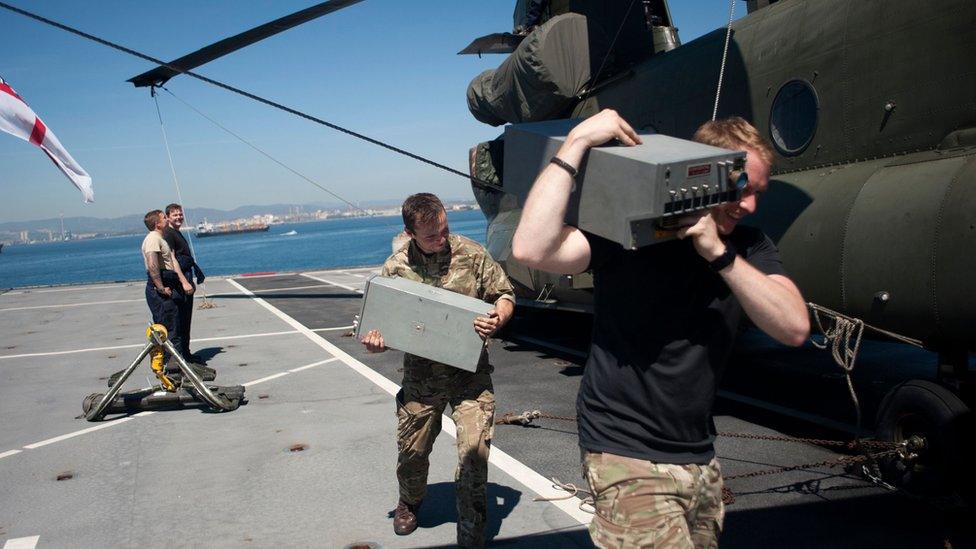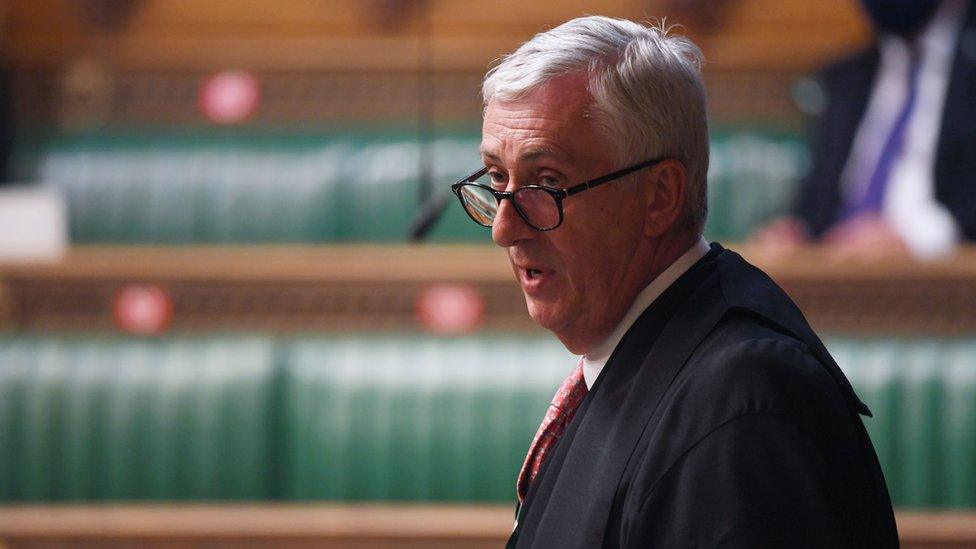Foreign aid: No plans to give MPs vote on cuts, says No 10
- Published

Overseas aid can include the transfer of items like food or equipment
The government has "no plans" to offer MPs a vote on reversing £4bn cuts to the overseas aid budget, No 10 has said.
The PM's spokesman argued the fall, from 0.7% to 0.5% of national income this year, was allowed under existing aid laws.
It puts ministers on a collision course with some Tory and opposition MPs, who say a vote on the cuts must take place.
They set out their case during an emergency Commons debate on Tuesday.
It came after a group of rebel Conservative MPs failed on Monday to overturn the cuts through a bill dealing with the UK's new research agency.
Commons Speaker Sir Lindsay Hoyle ruled their planned vote could not be allowed, as it was not within the remit of the law being debated at the time.
But he called on ministers to give the Commons "the respect it deserves" and find a way to offer MPs an "effective" vote on the issue.
A leading rebel, Tory MP Andrew Mitchell, claimed the group would have had enough support to defeat the government if the vote had taken place.
He had previously pledged to "use all the parliamentary procedures we can" to force a vote on the issue, if their amendment was not selected.
Legal action threat
Speaking on Tuesday, he said the government was denying MPs a vote because it "fears it could lose".
He added that the "unethical" and "possibly illegal" cuts also broke a Tory manifesto pledge at the 2019 general election to keep the 0.7% target.
The government reduced aid spending from 0.7% to 0.5% of national income this year, without changing the 2015 law that made the target binding.
Ministers have argued this legislation allows the target to be temporarily missed in exceptional circumstances - and says the Covid pandemic counts.
The PM's spokesman repeated this argument on Tuesday, adding the law "explicitly envisages the circumstances we now face" in the pandemic.
Some MPs and campaigners have rejected this argument - and have threatened legal action in a bid to force a vote on the spending.


What next in the battle over aid spending?
The government has said there are no plans for a vote on the cut to overseas aid.
But that doesn't preclude the cut from being restored.
Some of the Conservative rebels are hoping the chancellor will announce in due course - perhaps at the Spending Review - that the economy is on course to recover, and will say this allows him to gave a date for the 'temporary' reduction to end.
But the leading rebels are not pinning their hopes on wishful thinking.
They know that the Speaker is sympathetic to their argument that parliament is being by-passed.
And to the fact that it is the government which is 'rebelling' against its own manifesto commitment.
So there are active discussions on what parliamentary mechanism could be used to force a vote.
As Sir Lindsay Hoyle has lived up to his pledge not overrule his officials - the 'Commons clerks' - then any mechanism which cuts the mustard with them would be watertight.
At that stage, the hope is this would force the government to set a date to restore the cut, rather than face a likely Commons defeat.
But I am told that there will be 'extra-parliamentary' action too - in other words, a campaign to highlight the concrete effects of the cuts - in an attempt to make those who are sceptical of aid spending in the abstract to think again.
The government insists it isn't cutting aid just because this is popular with some voters.
Many former ministers are now determined to ensure that it's actually unpopular.

During Tuesday's Commons debate, Treasury Minister Stephen Barclay said aid spending would return to the higher 0.7% level "when the fiscal situation allows" but did not specify a date.
He said the decision to cut spending had been "difficult", but was justified by the "hugely difficult economic and fiscal situation" caused by the pandemic.
Backing the government's stance, Conservative backbencher Maria Miller said the "fiscal crisis" due to Covid also meant the move was right.
"It's not possible to continue with business as usual. These are not normal times," she added.

Sir Lindsay has pledged to look at "other ways" to give MPs a vote on aid spending
Former Prime Minister Theresa May was among several Tory ex-cabinet ministers backing the return to 0.7%, along with opposition MPs.
Ministers will be relieved to avoid a vote on the aid cuts this week, ahead of welcoming world leaders from the G7 group for a summit in Cornwall.
Campaigners have highlighted that the UK is the only member of the group of advanced economies to cut aid spending this year.
But the government has said that the UK remains one of the world's most generous spenders on aid, with spending above £10bn this year.
MPs may have to wait a while for another opportunity to force a vote on aid spending in the Commons.
This is because only a small number of government bills are due to receive detailed scrutiny in the coming months, following the start of the parliamentary year in May.
Related topics
- Published18 May 2021
